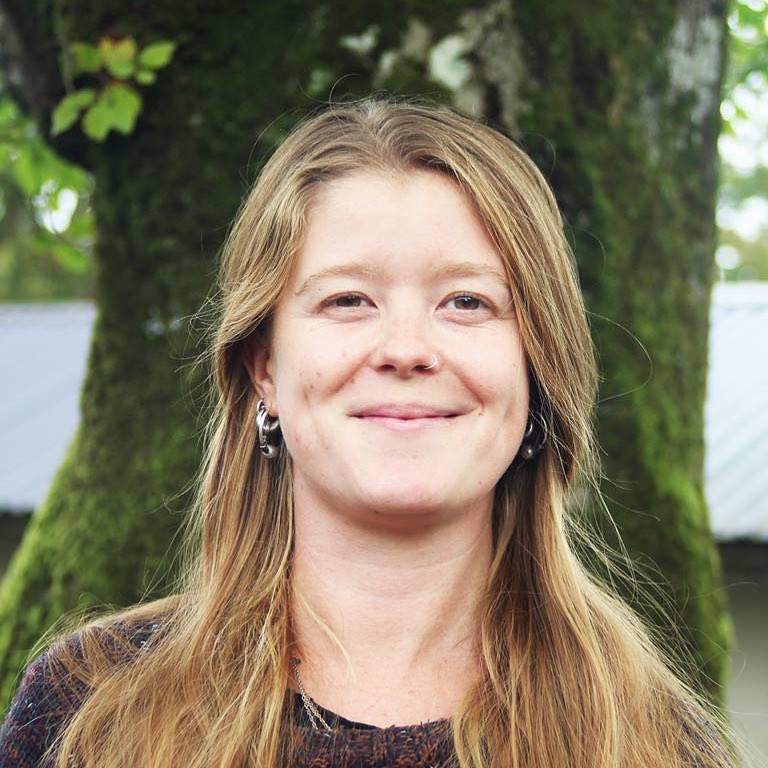
Niaomh Convery is a chef, facilitator and the co-founder of The Shared Plate, a community interest company that supports people to connect & build resilience through food. Niaomh has been working as staff at LIFEbeat camps for several years and has been a part of many programmes. More recently, Niaomh and her colleagues have run the kitchens at LIFEbeat, creating a food and cooking programme that involves every member of the community.
Here, Niaomh tells us more about how she first came across LIFEbeat, how it inspired her to found The Shared Plate, and what it is she loves about working creatively with young people.
How did you first get involved with LIFEbeat?
I got involved with LIFEbeat 6 years ago. I was spending time at a land-based learning centre called Embercombe. They used to host LIFEbeat in their wild and wonderful grounds in Devon and I decided to get involved as part of the facilitation team.
I had left London that year and I was looking for something to do with my skills. I am a trained chef, but I was really looking to do something that would make a difference to the world in some way. I got to Embercombe and realized I didn’t want to go back to London, but I still didn’t quite know what my gifts were and where I fit.
Before attending a LIFEbeat residential camp, I took the Creative Practice training, which is a requirement for anyone who wants to be a staff or volunteer. I totally fell in love with it. I loved the concept and the way it worked for young people. It just lit up my life. I did two camps that year. On the first one I worked with the young people in the kitchen, and for the second one I worked as a volunteer on the programme itself. I was just in awe of it. To see that transformation completely inspired me. It was just so easy to see the progression people made from the start to the end, and so many participants left each programme being deeply transformed by it. I loved seeing different subtleties of how the young people responded and realising that actually there really is something for everyone in this one beautiful programme. At LIFEbeat, there is one staff member for every two young people. I just think that is amazing because it really brings in that cross section of society within the facilitators. It gives all of the young people someone and something to relate to. I think that is so incredibly important.
Since then I have done two camps every year. I’m pretty in love with it. I can’t stop.
What is your favourite thing about LIFEbeat?
Where do I start?
I really enjoy the idea of getting out of yourself and who you might think you are. There is this idea that all of you is welcome. I think that is really taken on by staff and young people. You see that transformation in the way people show up. For me, one of the things I love is the opportunity to explore your gifts. I think that often, in the wider world, the areas that are created for young people are just about focusing one area, like getting your GCSEs or learning to play an instrument etc. I love that LIFEbeat encourages them to bring their whole-selves. When I think about what school was like for me as a creative person, it’s very hard to get really good access to a creative education . Until I got to 6th form the arts were just a little offshoot that you did for an hour a week. If you are someone like me who can’t sit still that is just not enough. I also think you often get told that that’s not a real way forward in the world. I think that LIFEbeat opens up this idea of freedom of expression and allows young people to explore some of those concepts and to explore creativity as a part of everyday life.
Can you tell us a little about the work that you do outside of LIFEbeat?
My background was working as a chef in London. When I moved to Embercombe I started doing experiential learning and I started to cultivate this idea of using my cooking to engage with people and help people to connect to themselves. After a few years I started to get a lot clearer about what I really wanted to do with those skills. Myself and another young woman called Megan Nash (who has also been a massive part of LIFEbeat) started a project called The Shared Plate which is about inspiring people to create confidence and resilience in themselves, each other and the wider community through food.
We run the kitchen at LIFEbeat every year and that has become a mini programme within a programme, we’ve really been able to run with it, which is a testament to the support Lifebeat offers.. It is all about the idea of the relationship with food and how we build on that. That’s the main focus of my work these days. We’ve recently opened a café and community space in Wales and the long term goal for that space is to train people between the ages of 16-24 to give them recognized qualifications in cooking and front of house. We want them to gain qualifications that will help people get into gainful employment, while approaching it in a more relaxed and supportive way, helping participants to reach their full potential.
Just before the pandemic we managed to run an amazing programme with women refugee and asylum seekers. It was about inspiring them to become confident facilitators in the kitchen. Each week a different woman would lead the session and teach us to cook the food that was close to their heart or cultural background. I love that concept because it is about non-hierarchical facilitation and skill sharing.
It’s all about food and people for me.
How has your work with LIFEbeat influenced your other areas of work?
I would say that The Shared Plate is formed on the principles of LIFEbeat. If I hadn’t done LIFEbeat I don’t think The Shared Plate would be here. That’s why LIFEbeat is so close to my heart. It’s shaped everything that I do. It’s shaped the way that we communicate with our participants but also with each other. We’re really passionate about creating mindful spaces and hearing everyone’s voice in the room, but also having a lot of play in what we do. All of that is inspired by our work with LIFEbeat and the real heart space that LIFEbeat creates.
How has LIFEbeat impacted you personally?
For me, a lot of it is about the friendships that I’ve formed. The friendships that I have from LIFEbeat are some of the dearest to my heart. I might see some people that I get on with very well for just 10 days a year but that 10 days is so rich that you make these bonds for life. Because of the way that you are taught to communicate at LIFEbeat, it’s unique and refreshing to get into those spaces and just interact with people who also understand how to interact in that way. The richness of communication with each other is there from the very beginning.
What advice would you have for someone who has just taken their first LIFEbeat training and is keen to learn more?
Try to do it as much facilitating as possible. After I first did Creative Practice, one of the first things that I did was offer to lead a few games at a friend’s hen party. They were my friends so they were kind to be and it helped me experiment and grow my skills. I think that the more that time passes between your training and using the skills, the more daunting it tends to feel.
What inspires you?
I’m currently watching a programme called TransParent, which is about the transition of a father with his children at adult age. I think it is so on point for the conversation around gender and sexuality and I have found that really inspiring. I would recommend watching it.
I’ve also just finished the book White Fragility. I took a long time to read it because I wanted to absorb it properly. That is informing the way that I am trying to be in the world at the moment, facing up the huge imbalance of race in society and recognising the privilege I have as a white person.
If you could give one piece of advice to yourself when you were younger, what would it be?
Be patient and be kind to yourself. I’m only just really learning that now. It’s not a sprint, it’s a marathon. In order to have longevity in anything you are passionate about, especially if you feel that you want to make change in the world, you have just got to be patient and go slowly and accept that you may not even see it in your lifetime. Just enjoy it while you are doing it and look for the smaller impacts that you have.
